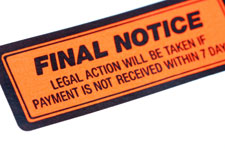 The increase in assessment collection efforts by Homeowners Associations (“HOAs”) is being seen nation-wide. States like California, Nevada and Texas are currently debating new legislation aimed at making some drastic, and potentially harmful, reforms to the ways in which HOAs can pursue and collect delinquent assessments.
The increase in assessment collection efforts by Homeowners Associations (“HOAs”) is being seen nation-wide. States like California, Nevada and Texas are currently debating new legislation aimed at making some drastic, and potentially harmful, reforms to the ways in which HOAs can pursue and collect delinquent assessments.
In California, there is a proposed bill that would significantly affect a HOA’s ability to collect delinquent assessments. SB 561 will, in a nutshell, make it much more difficult for a HOA to recover the collection costs and fees incurred in connection with collecting delinquent assessments. There is signficant industry opposition to the bill.**
Additionally, some property owners are beginning to take a more agressive stance against HOA collection efforts. In Nevada, investors in foreclosed homes recently filed a new class-action complaint against more than 500 Nevada HOAs. They allege that HOAs have unlawfully allowed collection companies to collect costs that were never incurred by the HOAs.
|
New legislation and legal challenges concerning HOA collection practices could radically impact the financial and operational structure of HOAs and collection companies. Hopefully, the increase in attention will help to (1) spotlight the tremendous toll that delinquencies are taking on HOAs and (2) provide a clear, settled framework for HOAs to use in their collection efforts. |
**To read more about industry sentiments toward SB561, visit CAI’s California Legislative Action Committee’s website.
 HOA Lawyer Blog
HOA Lawyer Blog


 Associations are required to levy regular and special assessments sufficient to perform their obligations under their governing documents and
Associations are required to levy regular and special assessments sufficient to perform their obligations under their governing documents and 